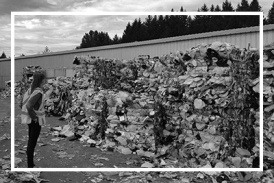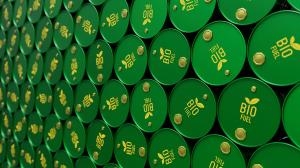BRK Technology Highlights Algae Biofuels as the Future of Clean Energy
Unlike batteries, which are limited by energy density, range, and recharge times, algae biofuels provide a higher energy yield per unit of fuel, allowing for longer operating hours and more efficient fuel consumption in heavy machinery and transport fleets. Algae biofuels can be used in existing infrastructure, such as combustion engines, without requiring costly modifications or downtime, making the transition smoother and more cost-effective compared to electric-powered solutions.
One of the key advantages of biofuels over battery power is their scalability. While battery power can be limited by the size and weight of batteries required for heavy equipment or long-haul transport, algae biofuels can be produced at large scales and integrated into fuel systems across a variety of industries. This makes algae biofuels a far more feasible solution for industries with high energy demands, such as logistics, shipping, and manufacturing.
Chief Executive Officer of BRK Technology Mr. Jin Wong, shared his perspective on the benefits of algae biofuels: “While battery technology has certainly made strides, algae biofuels offer a unique and practical advantage for industries that require high-density energy solutions. Algae biofuels not only deliver a reliable and sustainable energy source, but they also provide companies with a way to reduce emissions without the limitations of battery power. We’re excited to offer an alternative that empowers businesses to operate sustainably while meeting their energy needs.”
Through ongoing development, BRK Technology will provide businesses with the tools they need to achieve their sustainability goals while ensuring a greener, more sustainable planet for the future.
- - -
About BRK Technology Co., Limited
BRK Technology is a pioneering company in the development and commercialization of algal biofuels, dedicated to creating sustainable energy solutions that reduce carbon emissions. With innovative technologies and a commitment to environmental stewardship, BRK Technology is at the forefront of the renewable energy revolution.
Calvin Lau
BRK Technology Co., Limited
email us here
Legal Disclaimer:
EIN Presswire provides this news content "as is" without warranty of any kind. We do not accept any responsibility or liability for the accuracy, content, images, videos, licenses, completeness, legality, or reliability of the information contained in this article. If you have any complaints or copyright issues related to this article, kindly contact the author above.
COMMUNITY SECURITY SERVICE BOLSTERS DEFENSES IN RESPONSE TO ELEVATED THREAT WARNING FROM DHS/FBI
From Messy Moments to Meaningful Memories: 'Once Upon an Amateur Mom' is a Tribute to Mothers Everywhere
Ralph Caruso’s Above The Line Production Rentals Celebrates 10 Years of Growth as Key Supplier to Top Film Productions
Kalendarium
Więcej ważnych informacji
 Jedynka Newserii
Jedynka Newserii

 Jedynka Newserii
Jedynka Newserii

Handel

Ze względu na różnice w cenach surowce wtórne przegrywają z pierwotnymi. To powoduje problemy branży recyklingowej
Rozporządzenie PPWR stawia ambitne cele w zakresie wykorzystania recyklatów w poszczególnych rodzajach opakowań. To będzie oznaczało wzrost popytu na materiały wtórne pochodzące z recyklingu. Obecnie problemy branży recyklingu mogą spowodować, że popyt będzie zaspokajany głównie przez import. Dziś do dobrowolnego wykorzystania recyklatów nie zachęcają przede wszystkim ceny – surowiec pierwotny można kupić taniej niż ten z recyklingu.
Przemysł spożywczy
Rośnie presja konkurencyjna na unijne rolnictwo. Bez rekompensat sytuacja rolników może się pogarszać

Rolnictwo i żywność, w tym rybołówstwo, są sektorami strategicznymi dla UE. System rolno-spożywczy, oparty na jednolitym rynku europejskim, wytwarza ponad 900 mld euro wartości dodanej. Jego konkurencyjność stoi jednak przed wieloma wyzwaniami – to przede wszystkim eksport z Ukrainy i niedługo także z krajów Mercosur, a także presja związana z oczekiwaniami konsumentów i Zielonym Ładem. Bez rekompensat rolnikom może być trudno tym wyzwaniom sprostać.
Transport
Infrastruktury ładowania elektryków przybywa w szybkim tempie. Inwestorzy jednak napotykają szereg barier

Liczba punktów ładowania samochodów elektrycznych wynosi dziś ok. 10 tys., a tempo wzrostu wynosi ok. 50 proc. r/r. Dynamika ta przez wiele miesięcy była wyższa niż wyniki samego rynku samochodów elektrycznych, na które w poprzednim roku wpływało zawieszenie rządowych dopłat do zakupu elektryka. Pierwszy kwartał br. zamknął się 22-proc. wzrostem liczby rejestracji w ujęciu rocznym, ale kwiecień przyniósł już wyraźne odbicie – o 100 proc.
Partner serwisu
Szkolenia

Akademia Newserii
Akademia Newserii to projekt, w ramach którego najlepsi polscy dziennikarze biznesowi, giełdowi oraz lifestylowi, a także szkoleniowcy z wieloletnim doświadczeniem dzielą się swoją wiedzą nt. pracy z mediami.









.gif)

 |
| |
| |
|